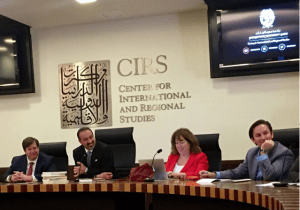Nichols College Adjunct Professor of Counterterrorism Studies Ardian Shajkovci, Ph.D., director of research and a senior research fellow at the International Center for the Study of Violent Extremism (ICSVE) in Washington, D.C., attended a United Nations conference in February at one the hotels that was bombed on Easter Sunday in Sri Lanka. Below, he offers his perspective on the attacks:
By ARDIAN SHAJKOVCI, Ph.D.

Far right, Ardian Shajkovci, Ph.D., adjunct professor in the Nichols College Counterterrorism Studies Graduate Program
In February, Anne Speckhard, Ph.D., director of the International Center for the Study of Violent Extremism (ICSVE) and I attended a United Nations Office on Drugs and Crime (UNODC)-organized conference in Colombo, Sri Lanka. A number of local, regional, and global (international) experts, discussed and presented their views on foreign fighters (Iraq and Syria), namely issues related to returnees from the conflicts and what lies ahead in terms of rehabilitation, reintegration, and even possible prosecutions for their participation in the conflicts. Local and regional participants from the government, non-profit and other civil society institutions discussed their respective national practices for rehabilitation and reintegration of former terrorists/combatants. Sri Lankan participants gave a compelling presentation on the history of conflict against Tamil Tigers (LTTE) as well as best practices on rehabilitation and reintegration of EX-LLTE combatants. During our four-day stay in Colombo, we found it to be very peaceful, far from “militarized” kind of countries we are often used to visiting. The Easter Sunday atrocities, where a number of churches and hotels were attacked by suicide bombers—including Kingsbury, one of the hotels where we stayed during our February visit in Colombo—shocked all of us.
We now know that the perpetrators of the suicide attacks are members of the National Thowheeth Jamaath (NTJ). It is a relatively small, local Sri Lankan Islamist group, mainly known for their extremist viewpoints and for vandalizing Buddhist statues. It is believed that the group enjoyed support from an international terrorist organization, though the extent of their links remains unknown. In our experience at ICSVE studying ISIS cadres in Iraq and Syria, and in corroborating our data with information received on Sri Lankan media, it is highly likely that the attackers either received help from returnees form the Syrian and Iraq conflict or engaged in some sort of coordination with other militant Islamist groups like ISIS or al-Qaeda. Or it could be a combination of both.
In our interviews with ISIS defectors in Iraq and Syria, we have learned of instances where ISIS cadres were invited to aid and/or directly head terrorist attacks outside Iraq and Syria on behalf of ISIS. ISIS and al-Qaeda are very adept at cementing relationships with organizations, groups, individuals, etc. who seem to share or appeal to same grievances. In addition, given the scale of the attack and the fact that it was rather successful for a group with no prior history of large-scale attacks, it is highly likely that the organization relied on some sort of logistical and financial support from another group—probably from an outside, larger and more experienced group. That being said, we live in an internet age, where it is rather easy to share instructions and advice on how to build bombs, and even chemical and biological weapons. See our most recent article published in the Daily Beast https://www.thedailybeast.com/isis-chemical-weapons-expert-speaks-in-exclusive-interview?ref=author
We must continue to support and applaud the efforts of Sri Lankan government to curb the appeal of violent extremism and terrorism in the country. During the February UNODC conference in Colombo, Sri Lanka, ICSVE highlighted the need to continue to use counter narratives to fight the appeal of violent extremist groups. We contended that narratives with local appeal that speak to local contexts are especially important. Despite ISIS’ territorial defeat in Iraq and Syria, ISIS is likely to continue to encourage, inspire, and even directly aid in the commission of terrorist attacks worldwide. They will continue to link their global agenda (jihadi ideology) to local grievances. In addition, Sri Lankan government must acknowledge and contend with ongoing threats of violent extremism and terrorism in the country, including National Thowheeth Jamaath (NTJ), despite its almost decade-long closure of civil war with Tamil Tigers. These are sensitive times for the country, and counterterrorism operations need to be undertaken wisely and perceptively, given the history of ethnic hostilities and intercommunal violence.
Ardian Shajkovci, Ph.D., is director of research and a senior research fellow at the International Center for the Study of Violent Extremism (ICSVE) in Washington, D.C. He is also an adjunct professor at Nichols College in Dudley, Mass., where he teaches courses on counterterrorism, and has recently been published in The Hill and Daily Beast.
Video of Ardian Shajkovci, Ph.D.: https://vimeo.com/292924591